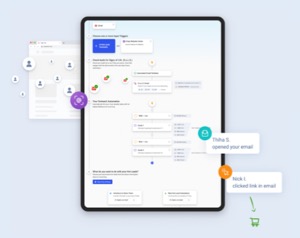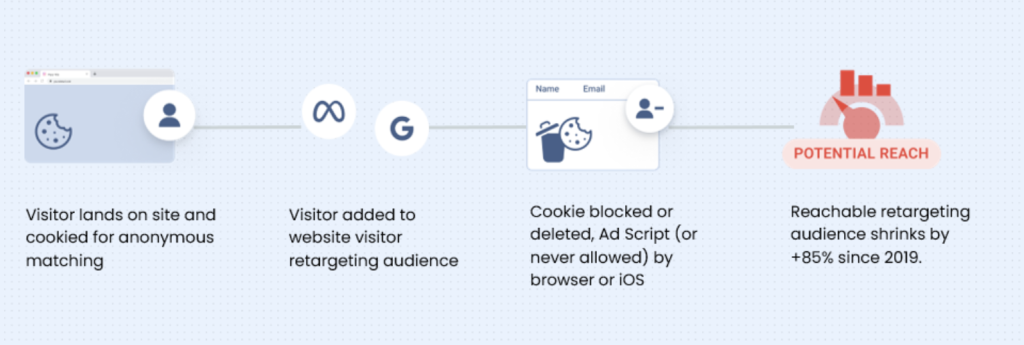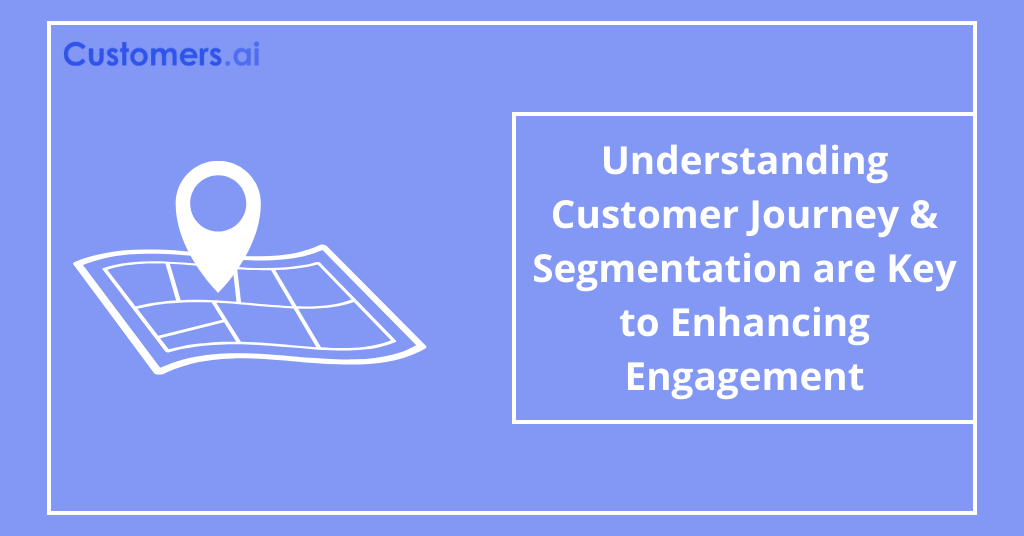I’ll start with an obvious observation: a customer’s first interaction with your company is never “making a purchase.” Though it’d be nice if they arrived immediately at the product they were interested in and bought it right away, most customers go on a long journey before ultimately forking over their cash. Understanding each customer’s journey, then, is absolutely key to building a better, more efficient marketing and sales process.
Even savvy companies are learning that this is easier said than done.
Years of targeted digital ads and email campaigns have raised customers expectations. They expect more personalization than ever.
Simultaneously, the death of third-party cookies and other privacy changes continue to make finding and using the data required to curate that personalized experience harder and harder to get.
That’s why our Customer Journey feature is so crucial. With our Website Visitor ID X-Ray Pixel, you can see how each identified visitor navigates your site. Seeing what choices they make before ultimately purchasing provides you with crucial information you can use to optimize your digital ads, email campaigns, and more!
Unlock High-Intent Leads Hiding on Your Site
Book a demo of Customers.ai’s U.S. website visitor identification, customer journey insights and remarketing platform to skyrocket conversions and sales.
I understand now, and I appreciate your patience. Let’s directly address the content within each subsection for sections II and III, focusing on delivering complete thoughts and insights within each part, without introductions to future discussions.
- The Evolving Expectations of Customers
- Challenges in Meeting the New Expectations
- Importance of Customer Journey Segmentation
- Understanding Customer Journey with Customers.ai
- Segmenting Based on Customer Journey

See Who Is On Your Site Right Now!
Turn anonymous visitors into genuine contacts.
Try it Free, No Credit Card Required
The Evolving Expectations of Customers
The Rise of Personalized Marketing
The digital age has transformed passive consumers into active participants who dictate the terms of engagement. They no longer navigate the digital world as mere observers but as individuals seeking a reflection of their unique preferences and interests. This shift has been fueled by advancements in data analytics and machine learning, enabling brands to deliver personalized experiences at scale. Consumers now expect interactions with brands to be tailored specifically to them, drawing on their past behaviors, purchases, and interactions to anticipate their needs.
Setting the Standard: The Influence of Tech Giants
Companies like Amazon and Netflix have not just participated in the evolution of consumer expectations; they’ve spearheaded it. By leveraging vast data to curate personalized experiences, these tech giants have created a new normal. Amazon’s recommendation algorithms that suggest products based on browsing and purchasing history, and Netflix’s ability to recommend shows and movies with uncanny accuracy, have set a high bar. These experiences have reshaped what consumers expect from all digital interactions, demanding a level of personalization once reserved for the realm of science fiction.
Challenges in Meeting the New Expectations
The End of the Cookie Era

The impending extinction of third-party cookies poses a formidable challenge to personalized marketing. For years, cookies have been the linchpins of digital advertising, enabling brands to track user behavior across the web. Their decline, driven by privacy concerns and regulatory changes, has left marketers searching for new ways to understand and reach their audiences. This seismic shift requires a reimagining of data collection and user tracking, pushing marketers towards more privacy-conscious strategies.
Navigating Privacy Regulations
The introduction of stringent privacy laws such as the General Data Protection Regulation (GDPR) and the California Consumer Privacy Act (CCPA) has further complicated the landscape. These regulations mandate greater transparency and user consent, limiting how marketers can collect and utilize data. As companies navigate this new terrain, they must balance the desire for personalization with the imperative of compliance, a task that often requires significant adjustments to their data practices.
Finding Alternatives for Data Collection and Analysis
In response to these challenges, innovative solutions have emerged. Marketers are increasingly turning to first-party data, gathered directly from interactions with their brand, as a cookie alternative. This shift not only complies with privacy regulations but also opens new avenues for building deeper, more direct relationships with customers. Additionally, technologies such as machine learning and AI offer new ways to analyze data, predict consumer behavior, and personalize experiences without infringing on privacy. These tools are paving the way for a new era of marketing, where personalization and privacy coexist.
Through these sections, the blog will delve deeply into the ongoing evolution of customer expectations and the challenges marketers face in meeting these demands, offering insights into the future of personalized marketing in a privacy-conscious world.
Importance of Customer Journey Segmentation
In the intricate dance of digital marketing, understanding the rhythm of your audience’s movements is paramount. Customer journey segmentation is not just a tool; it’s a compass that guides companies through the vast, often tumultuous sea of consumer interactions. By dividing the customer journey into distinct segments, businesses can tailor their strategies to meet individuals exactly where they are, enhancing engagement and driving conversions.
Crafting Tailored Experiences
At the heart of customer journey segmentation is the ability to craft experiences that resonate on a personal level. Whether a customer is at the discovery phase, considering their options, or ready to purchase, each segment requires a different approach. This tailored treatment transforms a generic interaction into a personal conversation, significantly increasing the likelihood of conversion.
Enhancing Customer Understanding
Segmentation offers a window into the customer’s world, providing insights that are otherwise obscured by the aggregate data. By dissecting the journey into manageable parts, marketers can identify patterns, preferences, and pain points specific to each segment. This deep dive into the customer psyche is invaluable, informing everything from product development to customer service strategies.
Optimizing Marketing Efforts
With resources always at a premium, efficiency is the watchword of any successful marketing department. Customer journey segmentation ensures that efforts are not wasted on mismatched messaging. By aligning marketing tactics with the customer’s stage in the journey, companies can allocate their budgets more effectively, maximizing ROI and minimizing waste.
Predicting Future Behaviors
Understanding the past and present of customer behavior is crucial, but the real power lies in prediction. Segmentation allows companies to forecast future behaviors based on observed patterns, providing a strategic advantage. Armed with this knowledge, businesses can preemptively address customer needs and desires, staying one step ahead in a competitive landscape.
In conclusion, customer journey segmentation is the linchpin of modern marketing strategy. It underpins the creation of personalized experiences, deepens customer understanding, optimizes marketing resources, and offers predictive insights into future behaviors. In a world where personalization is king, segmentation is the key to the kingdom.
Understanding Customer Journey with Customers.ai
Customers.ai’s Website Visitor ID X-Ray Pixel allows you to track the journey of every new contact you generate. Even better, setting it up is super simple.
- Add the Pixel to every page on your site. This ensures that you can track the whole journey. If a page doesn’t have our X-Ray Pixel on it, you won’t be able to see whether a customer visited that page or not.
- Click on your My Leads tab.
- Click on the contact.
- See their whole Customer Journey, including which pages they visited, the order of the pages they visited, which emails they’ve received, and what they did after they received the email!
Segmenting Based on Customer Journey

The specific strategy you’ll need depends on your customers and your industry. But here are some foundational principles that will be useful no matter what:
Study Your Customers
Now that you’ve got the data, make sure that you use it. Study the Customer Journeys to understand how they are navigating your site and engaging with your marketing campaigns.
You get detailed analytics for every email campaign you send to see what resonates and what doesn’t. Our Customer Journey tool shows you which pages Customers looked at and the order they looked at them, so you can see which actions lead to other actions.
Segment Based on Page Viewed
Our system allows you to build audiences based on different intent signals. Contacts that originate looking at your Blue Hats, for example, are probably interested in different things than contacts that originate looking at your blog.
You can easily build audiences that filter and then export them into your existing CRM flows!

Design Campaigns Based on Customer Journeys
If your Customer Journey insights reveal common trajectories, use that information to design specific campaigns based on that!
If you see, for example, that people are often looking at a specific informational page immediately before making a purchase, you can replicate that experience in your targeted email campaigns and digital ads.
Get started understanding customer journeys today by seeing how many of your website visitors we can turn into contacts!
Convert Website Visitors into Real Contacts!
Identify who is visiting your site with name, email and more. Get 500 contacts for free!
- See what targeted outbound marketing is all about. Capture and engage your first 500 website visitor leads with Customers.ai X-Ray website visitor identification for free.
- Talk and learn about sales outreach automation with other growth enthusiasts. Join Customers.ai Island, our Facebook group of 40K marketers and entrepreneurs who are ready to support you.
- Advance your marketing performance with Sales Outreach School, a free tutorial and training area for sales pros and marketers.
